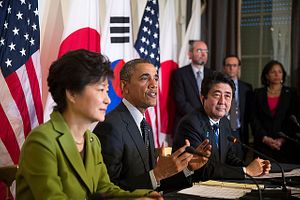The long-awaited bilateral summit between South Korean President Park Geun-hye and Japanese Prime Minister Abe Shinzo on November 2 represented an important and positive step in the troubled relationship between the two most important American allies in the Asia-Pacific region. Though lacking substance and obstructed by disagreement on the comfort women issue, the resumption of track 1 dialogue bodes well for the possibility of further interchange between the two nations. For the Obama Administration, which has been pushing for greater cooperation among its allies in the past few years, the summit signals a positive development for its strategy of building a common front to pressure an increasingly assertive China.
Yet this ostensible goodwill comes at a time when the two East Asian nations have been engaged in a protracted public relations war in the United States, pouring money into securing influence and support from American politicians and civic groups in a manner not much more dignified than mud-slinging.
Of course, the efforts of Asian governments to accrue influence in Washington are certainly nothing new, and have been extensively analyzed by Dr. Kent Calder in his book Asia In Washington. According to the work, in 2011 the two largest lobbying nations in Washington by number of registered lobbyists were Japan and Korea, each pursuing an extensive agenda ranging from cultural promotion to trade deals. In this respect, the efforts of these Asian governments have been largely successful, as evidenced by Japan’s recent partnership with Democratic senator-turned-lobbyist Tom Daschle and the PR firm DCI to promote the Trans-Pacific Partnership.
Since the 1980s, Tokyo has overseen one of the largest lobbying operations in the United States, spending more than $400 million annually to advance its business and political interests across a wide-ranging network that encompasses policymakers, legislators, think tanks, and civil society. South Korea has established a similar but smaller presence in Washington – apparently spending more than $40 million to support the ratification of the KORUS free trade agreement in 2010.
Controversy inevitably ensues, however, when the focus of the lobbying turns to history and politics. In early 2014, the Korean-American community in Virginia successfully lobbied its state legislature to revise references to the “Sea of Japan,” to include the “East Sea” as an alternative. In response, Tokyo hired McGuireWoods Consulting to hinder the bill while pushing its ambassador to submit a pressuring letter of protest to Virginia Governor Terry McAuliffe, containing a veiled threat that the “strong economic ties between Japan and Virginia may be damaged.”
Meanwhile, South Korea hired the consultant BGR group last June ahead of Prime Minister Abe’s visit to spearhead its public relations campaign in Washington. More than $150,000 was spent over six months to engage with the media and rally American public sympathies towards its cause, but most of all to demand an explicit apology from Abe over the comfort women polemic. The effort failed after the Japanese prime minister sidestepped the issue with the usual abstraction.
More recently, in light of Park’s visit to the U.S., the Japanese government allegedly bankrolled an organization called the “Voices of Vietnam,” which hired former Minnesota Senator Norm Coleman as its front-man to campaign for an apology from the Korean president over the war crimes and sexual violence committed by South Korean troops during the Vietnam War. The move appears to be designed to complicate the ROK government’s position in pushing for international recognition of Japanese war crimes in the past century.
Korea’s strategy may serve its purpose in the short term, but this backdoor influence buying may eventually degrade into a spending contest that Korea cannot expect to win given its smaller budget and clout in Washington. If gaining international recognition for the comfort women issue is indeed its primary objective, Korea stands a better chance mounting a persistent long-term campaign, rather than launching bouts of remonstration in response to U.S. visits by Japanese leaders.
As for Japan, other than the obvious moral problems involved in exposing another country’s errors to whitewash one’s own, it has little to gain by engaging in a PR battle abroad over its shady past. Further politicization of the history wars may shore up the LDP’s legitimacy at home, but will accrue unwanted attention from human rights groups that tarnishes its public image in the liberal West.
True progress in ROK-Japan relations must occur independently of each nation’s influence in the United States, and Seoul and Tokyo must realize that this entails coordinating interests with each other before aligning them to Washington’s. Both nations should thus refrain from using the U.S. as a platform to wage public relations campaigns at each other’s expense. Moreover, if it wants to avoid assuming partiality, Washington should do its own part in discouraging its allies from disbursing large sums of money on negative campaigns leveled against each other on its soil.
If American neutrality is compromised, Seoul-Tokyo relations will struggle to reach a level of responsiveness necessary to ensure an alignment of interests on defense issues surrounding the South China Sea or North Korea. For a U.S. disconcerted by South Korea’s overtures towards Beijing and the latter’s growing international presence, disunity among its allies is a situation it can ill afford, lest it is willing to witness the reemergence of a China-led East Asian order.

































